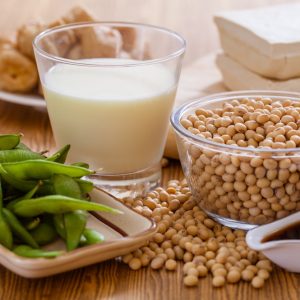Ask the allergist is a regular feature in our newsletters where Dr. Julia Upton answers your questions!

Dr. Julia Upton is a Canadian allergist who is on staff at Toronto’s SickKids Hospital in the Immunology and Allergy Department. She is an Associate Professor in the Department of Paediatrics at the University of Toronto and is the past Section Chair of Food Allergy and Anaphylaxis with the CSACI. Dr. Upton is also a member of our Healthcare Advisory Board.
Please note: Dr. Upton is answering as an individual allergist and her answers do not constitute an official position of her affiliated organizations. Her responses are for informational purposes only and do not constitute specific medical advice, recommendations, diagnosis, or treatment. Please talk to your doctor about any concerns or questions you may have regarding your own health or the health of your child.
This month she answers your questions about the safety of certain products for those allergic to soy.
I’m allergic to soy. Are products with highly refined soy oil, soy lecithin, or soy protein isolate safe for me?
Thanks for your questions about soy allergy and the safety of highly refined oils and soy derivatives (soy-based ingredients) like lecithin. If you’re not familiar with the term, “highly refined” refers to a manufacturing process whereby the amount of protein in a product has been significantly reduced, or in some cases removed. This process can vary with manufacturers.

In general, highly refined oils and soy lecithin are usually tolerated by those with soy allergy. Both contain a very small amount of soy protein, and it’s usually the protein which causes an allergic reaction. Before consuming products with soy lecithin or highly refined oils, you should discuss with your allergist to determine if these products can be an option for you.
A patient’s history of which foods they eat safely already can sometimes be used to determine the safety of these soy derivatives. In other cases, and depending on the severity of the soy allergy, an oral food challenge is sometimes performed (particularly if avoiding these derivatives is very problematic).
Soy protein isolate, however, should be considered very differently than highly refined oils and lecithin. It is concentrated soy protein, which means it has a high level of protein, and I would expect it to cause an allergic reaction in most people with soy allergy.
Notes from Food Allergy Canada:
If soy lecithin or soy protein isolate is an ingredient in a product, it must be included in the ingredient list and also in a “Contains” statement (e.g., Contains soy), if one is used. In contrast, highly refined soy oils are not considered food allergen sources and do not have to be labelled in the same way, according to food allergen labelling regulations. For example, if highly refined soy oil is an ingredient, it can be listed in the ingredient list as soybean oil, but not called out in the Contains statement, if used. Manufacturers must be able to provide evidence that their highly refined oil contains very little or no residual protein and are not considered to be of concern for those with soy allergy. Additional information can be found on the Health Canada site.
As always, it’s important to read the ingredient list and to understand the type of soy included in a product. Depending on the source, you can decide whether it’s appropriate for you. If you’re not sure about it, discuss your soy allergy with your allergist before eating the product in question.
Learn more about soy allergy and reading food labels.
Do you have a question you’d like to ask Dr. Upton in the months to come? If so, please send it along to us at info@foodallergycanada.ca.
Please note: Dr. Upton answers questions on general topics, please talk to your doctor if you have questions about your own health or the health of your child.
Tags: ask the allergist, Ask the expert


